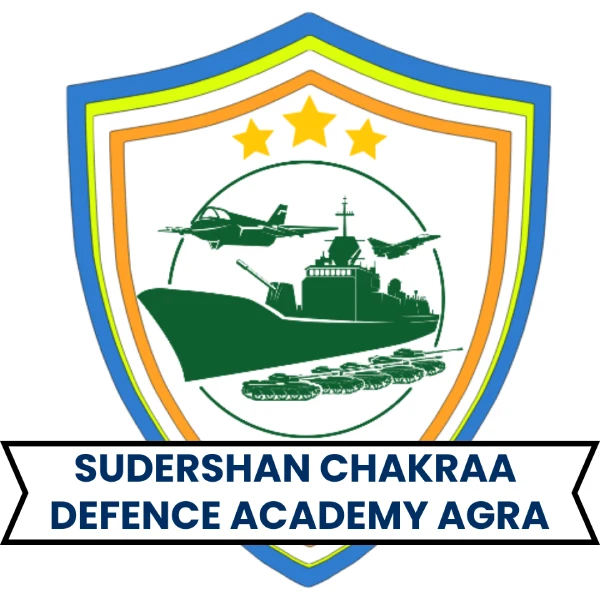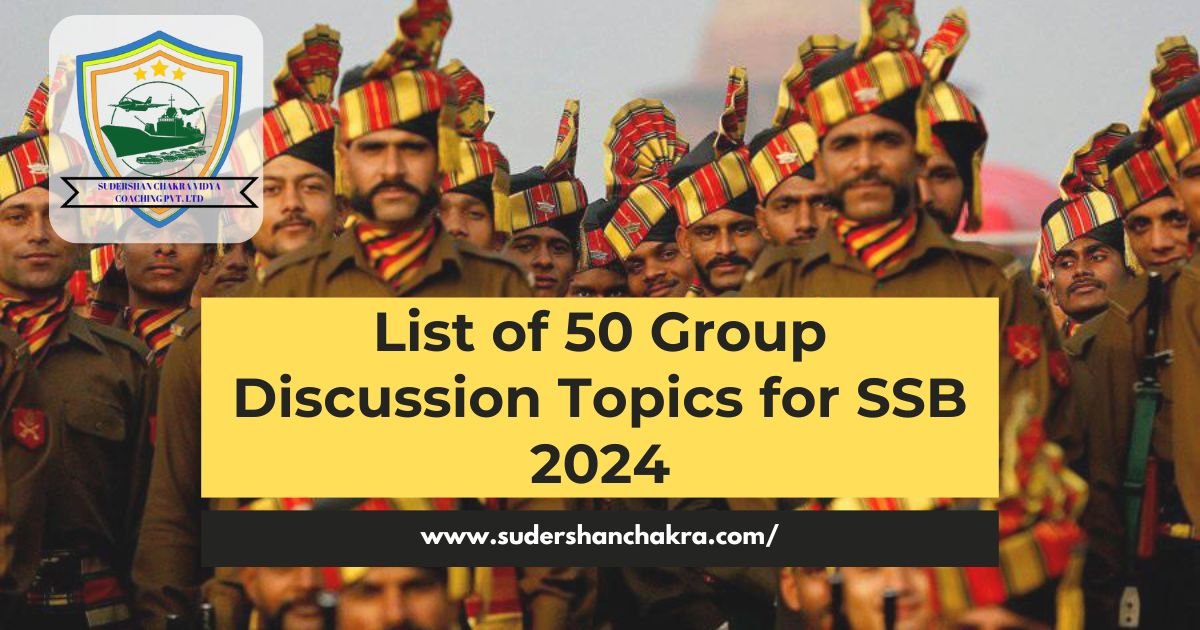With the SSB interview knocking at the door, it becomes mandatory for candidates to prove their communication and leadership skills through various assessments. The group discussion is one of the most important components of it. It not only checks whether a candidate can think clearly and present his thoughts and ideas effectively but also whether he can carry out meaningful interactions with fellow peers. To assist the aspiring candidate in preparation, we have prepared Group Discussion Topics for SSB 2024 revolving around contemporary issues and trends. Each topic carries a brief explanation that would help to place the ball in the right perspective for the candidates while creating well-rounded arguments at the same time. From artificial intelligence influence in modern warfare to the urbanisation problem of India, these topics can be creative enough to induce critical thinking and vital talk that may make a difference in SSB selection.
As the Service Selection Board (SSB) interview process for 2024 approaches, candidates must prepare for the Group Discussion (GD) segment, which is crucial for evaluating their communication and leadership skills. To help in this preparation, here is a List Of Group Discussion Topics for SSB 2024 each accompanied by a brief explanation to help candidates understand and articulate their views effectively.
50 Group Discussion Topics for SSB 2024 By Sudarshan Chakra:
- The Role of Artificial Intelligence in Modern Warfare
· Discuss how AI is revolutionising military strategies and operations.
- Climate Change and Its Impact on National Security
· Explore the link between environmental changes and security threats.
- Cybersecurity Threats in the Digital Age
· analyse the importance of cybersecurity in protecting national interests.
- Women in Combat Roles
· Debate the pros and cons of integrating women into combat positions.
- The Future of Space Warfare
· Speculate on the potential conflicts and treaties related to space.
- India’s Foreign Policy in a Multipolar World
· Discuss India’s diplomatic strategies in a world with multiple power centres.
- The Impact of Social Media on Society
· Examine how social media influences public opinion and social behaviour.
- Global Terrorism: Trends and Responses
· Discuss the evolving nature of terrorism and global counterterrorism efforts.
- Economic Reforms and Their Impact on the Defense Sector
· analyse how economic policies affect defence budgets and capabilities.
- The Role of the United Nations in Conflict Resolution
· Evaluate the effectiveness of the UN in maintaining global peace.
- The Ethics of Drone Warfare
· Debate the moral implications of using drones in military operations.
- National Education Policy and Its Impact on Youth
· Discuss how educational reforms shape the future of the nation.
- The Role of Technology in Disaster Management
· Explore how advancements in technology aid in managing natural disasters.
- India’s Approach to Renewable Energy
· Discuss India’s strategies for adopting and promoting renewable energy sources.
- The Relevance of Non-Alignment Movement Today
· Analyse the current significance of the Non-Alignment Movement in international relations.
- Agriculture Reforms and Their Impact on Rural India
· Examine the effects of agricultural policies on rural development.
- Mental Health Awareness in the Armed Forces
· Discuss the importance of mental health support for military personnel.
- The Influence of Globalization on Indian Culture
· Explore how globalisation affects cultural traditions and values in India.
- Sports as a Tool for National Integration
· Discuss how sports can promote unity and national pride.
- The Role of Media in Shaping Public Opinion
· Analyse the power and responsibility of media in a democratic society.
- The Impact of Privatization on the Indian Economy
· Discuss the benefits and drawbacks of privatising state-owned enterprises.
- India’s Role in Tackling Global Poverty
· Explore India’s contributions to international poverty alleviation efforts.
- The Importance of Water Conservation
· Discuss strategies for conserving water resources in the face of scarcity.
- The Challenge of Urbanization in India
· analyse the problems and solutions related to rapid urban growth.
- Space Exploration: Is it Worth the Cost?
· Debate the value and implications of investing in space missions.
- The Impact of Pop Culture on Youth
· Explore how popular culture influences the behaviour and aspirations of young people.
- Legalization of Marijuana: Pros and Cons
· Discuss the potential benefits and risks of legalising marijuana.
- The Role of NGOs in Social Development
· Evaluate the contributions of nongovernmental organisations to societal progress.
- Economic Inequality: Causes and Solutions
· analyse the root causes of economic disparity and potential remedies.
- India’s Defense Preparedness in the Context of Regional Tensions
· Discuss India’s readiness to handle conflicts in its neighbourhood.
- Artificial Intelligence: Boon or Bane?
· Debate the advantages and challenges posed by AI in various sectors.
- The Future of Work in a Post-Pandemic World
· Explore how COVID-19 has transformed work environments and practices.
- The Role of Ethics in Business
· Discuss the importance of ethical conduct in the corporate world.
- Environmental Sustainability: Need of the Hour
· Emphasise the urgency of adopting sustainable practices to protect the environment.
- The Impact of Global Trade Wars
· analyse how international trade disputes affect global economies.
- The Role of Startups in Economic Growth
· Discuss how new businesses contribute to innovation and economic development.
- India’s Position in the Global Climate Agenda
· Evaluate India’s policies and actions towards addressing climate change.
- Social Justice and Equality in Modern India
· Explore the challenges and progress in achieving social justice and equality.
- The Influence of Technology on Education
· Discuss how technological advancements are transforming educational systems.
- The Importance of Financial Literacy
· Emphasise the need for financial education to ensure economic stability.
- Global Health Issues and India’s Role
· Explore India’s contributions to global health initiatives and challenges.
- The Role of Science and Technology in National Development
· Discuss how scientific research and technological innovation drive national progress.
- Freedom of Speech: Limits and Responsibilities
· Debate the balance between free speech and responsible communication.
- The Impact of Tourism on India’s Economy
· analyse how tourism contributes to economic growth and cultural exchange.
- The Future of Electric Vehicles in India
· Discuss the potential and challenges of adopting electric vehicles on a large scale.
- The Role of Youth in Nation Building
· Emphasise the contributions and responsibilities of young people in shaping the nation’s future.
- India’s Cybersecurity Strategy
· Discuss the measures India is taking to protect itself from cyber threats.
- The Challenges of E-Governance
· Explore the benefits and obstacles of implementing electronic governance.
- The Impact of Artificial Intelligence on Employment
· analyse how AI is reshaping job markets and employment opportunities.
- India’s Strategy for Achieving Sustainable Development Goals (SDGs)
· Discuss India’s approach and progress towards meeting the UN’s SDGs by 2030.
This will require preparation on the part of the candidates to refresh themselves with current affairs and formulate their views on a wide range of subjects. In this context, the article has a list of 50 group discussion topics and invites the candidates into an interesting conversation set to reflect understanding of complexities in the world. Discussing such themes will allow the contender to think and express their views with conviction and dignity, far beyond the interview. So, when you are ready to hit this critical juncture of your selection journey, understand that every discussion does not just turn out to be another challenge to one’s knowledge but an exercise in leading/being part of the manifestation of leadership and teamwork.


